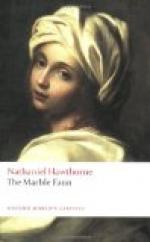“Wait, and it will open for you,” replied her friend. “The chasm was merely one of the orifices of that pit of blackness that lies beneath us, everywhere. The firmest substance of human happiness is but a thin crust spread over it, with just reality enough to bear up the illusive stage scenery amid which we tread. It needs no earthquake to open the chasm. A footstep, a little heavier than ordinary, will serve; and we must step very daintily, not to break through the crust at any moment. By and by, we inevitably sink! It was a foolish piece of heroism in Curtius to precipitate himself there, in advance; for all Rome, you see, has been swallowed up in that gulf, in spite of him. The Palace of the Caesars has gone down thither, with a hollow, rumbling sound of its fragments! All the temples have tumbled into it; and thousands of statues have been thrown after! All the armies and the triumphs have marched into the great chasm, with their martial music playing, as they stepped over the brink. All the heroes, the statesmen, and the poets! All piled upon poor Curtius, who thought to have saved them all! I am loath to smile at the self-conceit of that gallant horseman, but cannot well avoid it.”
“It grieves me to hear you speak thus, Miriam,” said Hilda, whose natural and cheerful piety was shocked by her friend’s gloomy view of human destinies. “It seems to me that there is no chasm, nor any hideous emptiness under our feet, except what the evil within us digs. If there be such a chasm, let us bridge it over with good thoughts and deeds, and we shall tread safely to the other side. It was the guilt of Rome, no doubt, that caused this gulf to open; and Curtius filled it up with his heroic self-sacrifice and patriotism, which was the best virtue that the old Romans knew. Every wrong thing makes the gulf deeper; every right one helps to fill it up. As the evil of Rome was far more than its good, the whole commonwealth finally sank into it, indeed, but of no original necessity.”
“Well, Hilda, it came to the same thing at last,” answered Miriam despondingly.
“Doubtless, too,” resumed the sculptor (for his imagination was greatly excited by the idea of this wondrous chasm), “all the blood that the Romans shed, whether on battlefields, or in the Coliseum, or on the cross,—in whatever public or private murder,—ran into this fatal gulf, and formed a mighty subterranean lake of gore, right beneath our feet. The blood from the thirty wounds in Caesar’s breast flowed hitherward, and that pure little rivulet from Virginia’s bosom, too! Virginia, beyond all question, was stabbed by her father, precisely where we are standing.”
“Then the spot is hallowed forever!” said Hilda.
“Is there such blessed potency in bloodshed?” asked Miriam. “Nay, Hilda, do not protest! I take your meaning rightly.”




